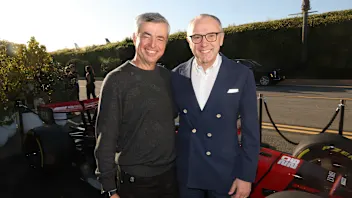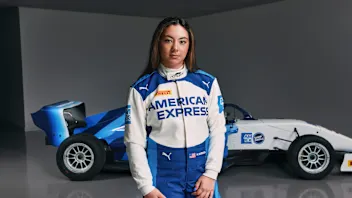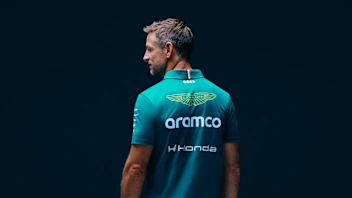Back at the sharp end - exclusive Q&A with Claire Williams
After their strong winter testing form, many were tipping Williams for instant glory in 2014. It hasn’t quite worked out that way, but the team are very much back among the frontrunners.
Deputy team principal Claire Williams discusses the changes behind their renaissance, including the Mercedes engine and Martini sponsorship deals, and reveals how the team orders row in Malaysia has galvanised the squad…
Q: Claire, pre-season was so promising. The guess was that Williams would fight for poles and wins at every race. The reality right now is a bit different. Why has it gone slightly wrong?
Claire Williams: I don’t think it has. But there has been a lot commentary around Williams - where we may have been and what we may have been ahead of Melbourne. As a team internally we knew where we were. So we didn’t have the expectation that we were going to win races - and we never would go into a season thinking that we are going to win…
Q: …but wasn’t it flattering that everybody wrote that it would be possible?
CW: Of course that was great, and it brought a lot of pressure to the party - especially on the back of last year when it was so disappointing - to then have people telling you that they think you could be a winning team again. Yes, that was great and gave a lot of positive momentum to actually go for changes. That was really important. We always set the goal to improve upon last season’s championship position. To consistently score points - and even some podiums - would be fantastic.
Q: Valtteri Bottas said that chief technical officer Pat Symonds makes a huge difference - what kind of difference can you report?
CW: Pat’s overriding philosophy is a kind of simplification. It is all about getting the basics right again and then building from there. I think we lost that basis a bit at Williams. There are four key areas across the race team - aerodynamics, design, track operations and vehicle dynamics - and all these areas need to work well together. One of Pat’s major focus points is the communication between those four groups, because if it is not functioning as it should you won’t improve your performance. Of course bringing in new heads of the four different departments also had a huge impact.
Q: Does that also help explain the team’s lack of success in previous seasons? That the team’s structure had become too complicated, a problem Pat has helped to rectify?
CW: Yes, that’s right.
Q: Felipe Massa said that he would openly share everything he learned at Ferrari. How much knowledge has he brought to the squad?
CW: Did he say that? Excellent! Well, one of the reasons why Felipe was so attractive to us was his experience, that fact that he is a race winner, and that he has worked for one of the giants of our sport. Of course he is able to share what he’s learned at Ferrari - but no secrets. I don’t think that he is giving away the secrets of Ferrari. (laughs)
Q: How has Felipe blended in at Williams? There is a huge difference in corporate culture…
CW: Yes, it is so different, but then all the teams have different personalities. There are similarities between Ferrari and Williams - the fact that we are equally passionate about what we do; that we are here to win. Those are similar at every team up and down the grid, but Ferrari and Williams are probably more equal than the rest. The family spirit is equally strong in both teams - something that Massa appreciates. He is kind of a Williams guy, a Williams driver. So he has settled down very quickly. We know how to make him feel at home and he knows how to get the best out of the team. We are thrilled to have him at this stage of his career as Williams is also on a new path as well, a new future. Bringing those two together will hopefully prove to be a strong platform.
Q: How did that unfortunate team order in Malaysia go down with Felipe - and how did his ignoring it go down with the team?
CW: It was a difficult situation in Malaysia - and one we do not want to repeat. We were not prepared for that and didn’t handle the situation very well, but what is important is that we got away from that race realising that we hadn’t handled it well. We pulled together very quickly to diffuse the situation, and talked it through - with the engineers, the drivers - and put together new procedures so that there will not be a repeat of that situation. Right now there are no hard feelings. Everybody understands that it was meant for the best of the team, but sometimes you get wrong calls in a highly-pressured situation on the pit wall. In hindsight everything looks different. In that moment the guys made the call because they thought it was in the interests of the team. But it is all behind us now and we have moved forward.
Q: That was the team side of the team call - but what about Felipe’s ignoring it? That when it really mattered, you couldn’t rely on your driver to accept the team’s decision?
CW: I think Felipe thought that he was going quicker than Valtteri, so he thought ‘okay, go and try to overtake me!’ Fine - that’s fair enough to me. But we talked it over after the race and we now have procedures in place for such a situation that we have all agreed to. Such a situation will not happen again.
Q: In Martini, Williams have an iconic title sponsor with a long standing in F1 racing. When did talks start - and why did Martini pick Williams?
CW: There are quite a number of similarities between our two brands, and the chances that it will be a successful partnership increase when you do have similar core values - as we do have with Martini. They are a family-owned business; Williams is as well. The flexibility that they wanted to have coming back into Formula One was very important for them, and as an independent team we can give our partners what they are looking for. We demonstrated to them that we could be flexible in our approach, and that played a key part in their decision to come to Williams. We are delighted about it. Our car looks really great in Martini’s iconic colours.
Q: Jean Todt has been quoted as saying that two teams - Sauber and Williams - said a budget cap was urgently needed or they would run into troubles. What are the facts - and how urgently are cost controls needed?
CW: We all know that there have been endless discussions about it - whether you call it budget cap or cost saving or cost control - and it is hugely important. I don’t think it is just important for an independent team like Williams - it is also important for our sport. We have to be open for new teams coming in, and the current costs are not encouraging that at all. You have to make sure the teams you have can survive. We have to make sure that the discrepancy is not getting too big - for the racing, and consequently for the fans. And we have to stay relevant. If we start spending what we did ten years ago - almost half a billion a year to go racing - people who look at this from the outside will think ‘what the hell is Formula One doing?’. No partner or sponsor would be able to justify that. Raising that kind of budget is simply no longer feasible in the current economic conditions.
Q: A few years ago Frank (Williams) was totally against any form of budget cap. Is your stance the ‘new’ Williams approach to the issue?
CW: Well, Frank was always in favour of cost control…
Q: …but he was heavily against the idea of somebody sneaking around checking up on everything…
CW: …yes, that’s what he didn’t want: somebody sneaking around and looking at the books. But now we are a listed team and our books are open to everybody, so there has been quite some change. Now we have to make sure that we are sustainable and that Williams has a future.
Q: Switching to the Mercedes power unit has been a major boost to the team. What were the reasons for the switch? Is it a more expensive solution?
CW: Obviously the decision to go for a Mercedes power unit was - in hindsight - the best step we could have made. It was made very early last year. There are not so many engines around, and we wanted the best one, so we had to work quickly and do the due diligence with our senior management and engineers to work out what the best engine was - and the Mercedes engine came out on top. They are a fantastic partner.
Q: But was it a more expensive solution than Renault or Ferrari?
CW: No, it was not.
Q: How close is the relationship?
CW: It is close and transparent.
Q: So Williams is not the ‘external test bed’ for Mercedes?
CW: Ha, no, not at all!
Q: After a terrible season in 2013, what would you make you happy in 2014?
CW: If we go to every race knowing that we go real racing again. Results-wise, of course we want to get both cars in the top ten in qualifying and for both cars to score good points in every race. If we could win a race again, that would be magic, but that’s a big step from where we were last year. There is a lot of ambition to get us back to where we were. In 2014, that translates to fighting with Mercedes. We have great car and we have two great drivers.
Q: Can you envisage Valtteri being the next Williams Formula One champion?
CW: I want both Valtteri and Felipe to be the next Williams Formula One champions!
Next Up
.webp)



.webp)
.webp)